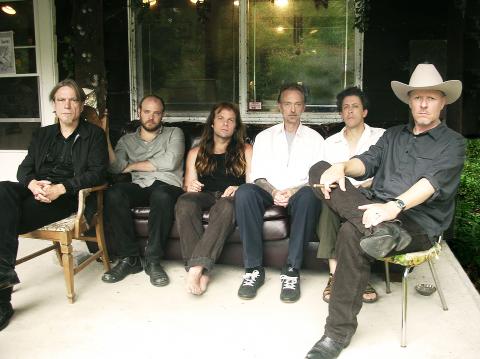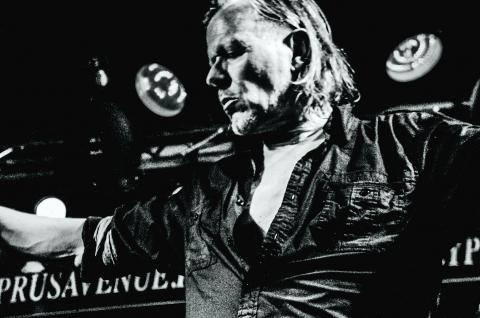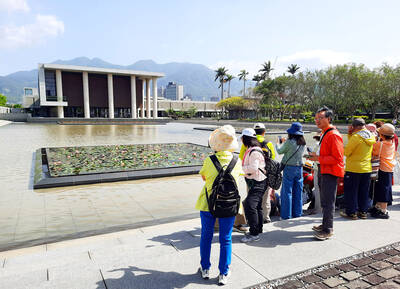There was a time when The Clash were called “The only band that matters.” Yeah, it was a marketing ploy by the band’s label, CBS, but it caught on. People took to it because The Clash were looked to as one of the bands in the late ‘70s early ‘80s that was supposed to see off the lumbering, bloated dinosaur that was rock ‘n’ roll. Well, forget The Clash. Forget the Sex Pistols. Forget all the bands of their ilk that were supposedly destroying music as we knew it, ripping down its very foundations while ushering in the snarling first wave of punk.
Why should we forget them? Because they were merely operating within the same set of musical conventions as rock musicians were, just doing it faster, sloppier and simpler. One of the few bands of that time frame that truly set out to operate wholly free of convention was an arty New York act of pure atonal malice known as Swans — a group that thought nothing of the fact that they were sometimes put last on a bill for the pure purpose of clearing out the crowd at the end of the night with their nightmarish blast of tempestuous, repetitive noise.
Punk didn’t destroy rock ‘n’ roll. Swans did. They destroyed it and rebuilt it in their own ghastly image reflective of all humankind’s ills, and in doing so became the greatest rock ‘n’ roll band of an epoch they gave birth to. In the examination of music from the early 20th century to the present, there should really be only two time periods — pre-Swans and post-Swans. Everything else, for the most part, is just a copy of a copy going all the way back to the Jazz Age.

Photo Courtesy of Owen Swenson
At their heart of Swans, through three decades and 13 studio albums, is their band leader. Their Howlin’ Wolf. Their great madcap genius barking at a moon he once thought was meant solely to crash down on his troubled head. Michael Gira — survivor, contrarian, anarchic musical terrorist. A book could be written on Gira’s wandering life and artistic explorations, but it’s probably best to simply let the man’s words stand on their own. And so it goes, here’s Michael Gira on ...
The chart success of Swans latest album, To Be Kind:
“I just do the work and hope for the best, and it’s good that more people seem to be interested in it. But if I thought too much about that I would have given up years ago.”

Photo Courtesy of Sibastian Sighell
The development of grooves and rhythms on To Be Kind:
“It’s through playing live. And some of the pieces, some of them can’t legitimately be called songs. They started out as a simple groove or sound idea and we just started exploring them live. Most of our set now is sort of similar. It’s pieces that are just kind of growing as the tour progresses. Things change and shift constantly within that context.”
The working relationship with long-time guitarist Norman Westberg:
“I don’t believe I’ve ever had a long conversation with Norman Westberg. But he’s the person I have to say the least to in the band about parts and things. He just has an intuitive grasp of what’s necessary for Swans.
The perception of the band today still largely focusing on its past:
“I just can’t think about that anymore. There’s a lot of young people that come to the shows. They don’t seem to share those preconceptions. But people go for the salient thing — for what’s easiest. And I suppose in the early days the music was extreme and might have been interpreted as being negative, although I felt that the act itself was quite positive. Now what I emphasize, when I speak about the music, is the positive aspects, because that’s what it is to me.”
The source of his perseverance:
“A healthy fear of death or failure, I suppose. I just think it’s important, with your short time on earth, that you make good work, and so that’s what I try to do.”
Sound as a path to a higher plane:
“During the live experiences now, it seems, when the band is effortlessly conjoined and we’re reaching to a higher place, that the audience goes with us. It’s not like we’re religious figures or shaman or any cliche like that. But there’s something that happens with sound and volume, I suppose, when it reaches a certain crescendo, that it naturally is elevating. It might be a kind of spiritual experience.”
His past reputation for being, in his words, “...a real jerk:”
“I guess if you ask people that know me they may concur that I am indeed a jerk. But I definitely don’t feel as much that the world is my enemy as I used to, and I couldn’t even describe to you why I used to feel that way.”
Improvisation:
“You can’t just stand up there and play by rote. That’s one of the reasons that we continually shift the material and develop it in each show as things go, is to remain sort of uncomfortable, and always trying to find something new. We don’t want to just recite songs from a record.”
What’s left to explore in the Swans sound:
“We’re developing songs live, and if it felt hackneyed or like a return to form we probably wouldn’t be doing it. I guess I would leave it up to other people to determine if it’s fresh or new or any of that sort of thing. We don’t really have a choice. We just dive in and do the work, and it leads you where it does, and you try to use your critical faculties to make sure that you’re not parroting yourself.”
■ Swans takes the stage at 8pm on Jan. 31 at Legacy (傳音樂展演空間), 1, Sec 1, Bade Rd, Taipei City (台北市八德路一段1號). Tickets are NT$1,900 in advance, NT$2,200 at the door.

When the South Vietnamese capital of Saigon fell to the North Vietnamese forces 50 years ago this week, it prompted a mass exodus of some 2 million people — hundreds of thousands fleeing perilously on small boats across open water to escape the communist regime. Many ultimately settled in Southern California’s Orange County in an area now known as “Little Saigon,” not far from Marine Corps Base Camp Pendleton, where the first refugees were airlifted upon reaching the US. The diaspora now also has significant populations in Virginia, Texas and Washington state, as well as in countries including France and Australia.

On April 17, Chinese Nationalist Party (KMT) Chairman Eric Chu (朱立倫) launched a bold campaign to revive and revitalize the KMT base by calling for an impromptu rally at the Taipei prosecutor’s offices to protest recent arrests of KMT recall campaigners over allegations of forgery and fraud involving signatures of dead voters. The protest had no time to apply for permits and was illegal, but that played into the sense of opposition grievance at alleged weaponization of the judiciary by the Democratic Progressive Party (DPP) to “annihilate” the opposition parties. Blamed for faltering recall campaigns and faced with a KMT chair

Article 2 of the Additional Articles of the Constitution of the Republic of China (中華民國憲法增修條文) stipulates that upon a vote of no confidence in the premier, the president can dissolve the legislature within 10 days. If the legislature is dissolved, a new legislative election must be held within 60 days, and the legislators’ terms will then be reckoned from that election. Two weeks ago Taipei Mayor Chiang Wan-an (蔣萬安) of the Chinese Nationalist Party (KMT) proposed that the legislature hold a vote of no confidence in the premier and dare the president to dissolve the legislature. The legislature is currently controlled

Dull functional structures dominate Taiwan’s cityscapes. But that’s slowly changing, thanks to talented architects and patrons with deep pockets. Since the start of the 21st century, the country has gained several alluring landmark buildings, including the two described below. NUNG CHAN MONASTERY Dharma Drum Mountain (法鼓山, DDM) is one of Taiwan’s most prominent religious organizations. Under the leadership of Buddhist Master Sheng Yen (聖嚴), who died in 2009, it developed into an international Buddhist foundation active in the spiritual, cultural and educational spheres. Since 2005, DDM’s principal base has been its sprawling hillside complex in New Taipei City’s Jinshan District (金山). But